 Ross Douthat, Bad Religion: How We Became A Nation Of Heretics.
Ross Douthat, Bad Religion: How We Became A Nation Of Heretics.
I was skeptical about this book because of it’s title. Who needs another indictment about Christians and the way they practice their faith? And how might a New York Times columnist be qualified to tackle such a topic as religion in America?
But this turned out to be a stunning book for me, opening up whole new ways of thinking about Christians in our post-Christian world. I have come to have enormous respect for Douthat’s work, one more (along with David Brooks) token conservative (in this case Christian) writer for the Times.
Douthat presents a thorough analysis of the state of religion in our society and the unfortunate heresies we have constructed and accepted over time. Our accommodation to culture has severely damaged our influence on that culture There is disturbing information here, to be sure, but I come away stimulated into new thinking about what cultural engagement must mean for Christians in our new day.
A must read for anyone interested in our new world and how we live authentic Christian lives in a post-Christian world.
Ian McEwan, Sweet Tooth
Just finished Sweet Tooth, the latest novel by the important British novelist Ian McEwan. McEwan is the author of Atonement and Saturday, among so many others. This current novel is a good read, to be sure, a wonderful layered plot, suspenseful to the very last page of the book. We are in the hands of a master story teller, and that is pleasing.
Our plot involves two young people who fall in love early in the novel: the man is a writer; the woman (the novel is told from her point of view) is a secret intelligence officer for Britain’s MI6 (Her Majesty’s Secret Service). The way all of this fits together is wonderfully intriguing.
This is a book about writing, a book about how to carry on a love affair in our modern moment, a book about the MI6 (and by extension the CIA), a book about carrying secrets. It is a study about why we need to be honest and transparent.
Ultimately, though, it is a book without one hint of anything we might call spiritual. I come away, having enjoyed the plot, with a bitter taste. This is an utterly godless world. What we call meaning in life is limited. Hopefulness is so tentative, so precarious. Trust is always tested.
I come away yearning for something deeper for these characters. As with so much fiction in our time, we are not going to get it. What we get is what it feels like to live in the world when Nietzsche has finally won the day. This is a world as imagined by our new atheists, McEwan prominently among them. In the end the lives portrayed in the novel are not very radiant. In the end the world does not shine out with any sort of illumination. It is flat. It is ultimately dull. In the end, it is not very satisfying.
“Oh brother,” I can hear someone muttering, “why the Puritanical worry that someone might just enjoy the plot.” Well, I agree, up to a point. I enjoyed the plot too. But I grew up on literature, starting with the Bible, where stories have depth, where life entertains mystery, where the sacred shines out from the ordinary. This is what I go looking for when I read a novel or any piece of literature. I don’t find it too often these days, certainly not in the world of Sweet Tooth.
Still, give it a try. It is another fine portrayal of the world we inhabit these days. For that reason, it is worth it.
Peter Brown, Through The Eyes Of The Needle: Wealth, the Fall of Rome, and the Making of Christianity in the West, 350-550 AD
This book will not make the best-seller lists, I suspect, but what a remarkable read it is. The focus is sharp, perhaps narrow, with a penetrating eye on the fourth through the sixth centuries AD. These are the pivotal years when the Roman empire finally collapsed. This was the time as well when the Christian church gained its stabilizing foothold for the future of European civilization.
Even narrowing more, the topic of the book is money, how wealth was regarded and used by both pagan and Christian Romans. We watch with fascination as Brown masterfully unfolds the changing notions of power, all driven by wealth. All of this is messy and conflicted, but the final story is one of an emerging Christian church that ultimately provides both financial and spiritual guidance for a chaotic world.
But narrow is not the way to describe this incredible book. The research is deep, making use of all the latest archeological findings and the most recent interpretations. No stone is left unturned. There are two hundred pages of endnotes and bibliography. We are in the hands of a master scholar.
The enervating dangers of taxation, the developing mission for the poor, the threat of barbarian forces, the unraveling of the unity of the empire—all of this is the story of the decline of Rome. We take heart, that out of that chaos, the Christian voice began to shape the culture in positive ways for the future.
 Hilary Mantel, Bring Up The Bodies
Hilary Mantel, Bring Up The Bodies
I highly recommend this long-awaited new novel by Hilary Mantel. While the title—Bring Up The Bodies—may seem a bit shocking, the novel is flat-out dazzling. This is the second in Mantel’s planned trilogy on the ever-intriguing life and times of England’s Henry VIII. The first volume was the widely acclaimed Wolf Hall.
I feel compelled to begin with a little warning: This is an earthy, at times bawdy book. Sometimes it’s language and situations may offend. My rule of thumb in these matters is to ask whether such language and content tip over the edge toward the merely gratuitous, surely an indictment on good judgment and good art.
I don’t think that has happened in this fine novel. Henry’s England was a lecherous and bawdy time. We know that from Shakespeare’s work. We know as well that Henry was a notorious womanizer, kingly and discreet in his pursuits perhaps, but adulterous nonetheless. There is no escaping or excusing the seamy nature of this complicated historical moment.
But here is the haunting question for Henry’s life (our years are 1535 and 1536): Does he dump his second wife, the mysterious Anne Boleyn, out of lust for a new woman, or does he indeed desire stability for his kingdom, stability that will come only from a male heir, something Anne has failed to provide?
And then there is this unresolved question: Is Anne guilty, as charged, of adultery with five suitors, including her own brother, all of whom are executed with her? Or are the charges trumped-up in order for Henry to get his way?
One subplot always in Henry’s life: In order to divorce his first wife Katherine, Henry forced England forever to separate from the Pope and the Catholic Church, who would not give their blessing, establishing thereby the Church of England, under the King’s ultimate authority. What we have in the life of Henry VIII is the entanglement of personal desire, the stability of the kingdom, and the history of the Christian church across Europe and England.
And then there is this fascinating feature of the novel: Everything is told in the words, and seen through the eyes, of Thomas Cromwell, an abused blacksmith’s son who has climbed to become perhaps the second most powerful person in England. He shapes the King’s opinions and his decisions. He manages his massive affairs of state, even while amassing a fortune of his own. Is he a good man?
We grapple here with the nature of power, the power of this king, perhaps of all kings, ruthless at times, benevolent at times, precarious and fragile, yet in the end a frightening power next to God. We are left asking does the King abuse his power for his own desires? Was all this carnage necessary? Who is guilty of what? Is the nation more stable in the end? Did Anne Boleyn deserve to come to such an end? Was she guilty? And what is the future for our main character Thomas Cromwell?
These are the questions the reader is left to answer as we close the last page of this marvelous novel.
N. T. Wright, Simply Jesus: A New Vision Of Who He Was, What He Did, And Why It Matters
N.T. Wright has done it again, writing here a new statement about Jesus, one that is clarifying, bracing, fresh, yet another book by this great scholar that may change your life. Wright says that people in Jesus’ day “were looking for a singer to sing the song they had been humming for a long time, but he was the composer, bringing them a new song to which the old songs they knew would form, at best, the background music.” This book is so powerful because this is indeed the singer we are listening for in our day as well.
 Stephen Greenblatt, The Swerve: How the World Became Modern
Stephen Greenblatt, The Swerve: How the World Became Modern
I highly recommend this book, but with caution. On the one hand, it is a marvelous depiction of the emergence of our modern way of seeing things. We follow the journey of a book-hunter in the fifteenth century, a character named Poggio Bracciolini, who discoverers, in the musty library of a remote monastery, a centuries-old, long-buried copy of Lucretius’ On the Nature of Things. The drama of the hunt is enchanting. The Swerve reads like a novel.
Lucretius’ book, as Greenblatt sees it, written before Christ, rediscovered by Poggio in the fifteenth century, launched the opening of the humanist Renaissance. Finally, so the story goes, history could discard for good the dreary, brutal, pleasureless Christian ethos of the Middle Ages. Let the new age of reason, pleasure, and intense intellectual curiosity begin. Let us once again enjoy sex and nature.
On the other hand, we must be ever so careful accepting Greenblatt’s reckless debunking of the Christian Middle Ages. He portrays this rich period of history as totally bereft of intellectual exploration, any kind of pleasure in life, even joy. How silly. Greenblatt wants desperately for Lucretius’ godless, epicurean, humanist view of things to win out, and sets out to write a compelling book in favor of all the legitimate fruits of the Renaissance. But to discount the medieval influence on Western thought is to distort history for the sake of one’s bias.
We are missing here more than half the story. The great, rich Christian tradition of the Middle Ages — from the crucial formation of holy Scriptures, through the brilliant awakening of Augustine (the fourth century), through Saint Benedict and the founding of influential monasticism (the sixth century), and then through Aquinas’ powerful discovery of Aristotle (the thirteenth) — all of this is summarily dismissed with the flick of the back of Greenblatt’s hand. The two towering figures of the sweep of the Middle Ages, Augustine and Aquinas, do not even appear in Greenblatt’s index.
From such a noted and rightly praised scholar, the father of the new historicism, as he is sometimes called, there is a huge gaping hole impossible to ignore, even though this is a book well-worth reading. In the spirit of the new atheism, I suppose, the argument of The Swerve is one every Christian ought to encounter, as we seek to make the case for the intellectual credibility and the sheer joy of the Christian gospel for our time.
 G.K. Chesterton, Saint Thomas Aquinas: “The Dumb Ox”
G.K. Chesterton, Saint Thomas Aquinas: “The Dumb Ox”
I have been on an extraordinary reading journey through the summer. I have been reading everything I can get my hands on by and about Augustine and Thomas Aquinas, two towering figures in Christian history, one from the fourth century, the other from the thirteenth. I don’t fully understand my current obsessive curiosity, but I revel in what I am discovering. Stay tuned.
This reading journey all began when I discovered an incredibly wonderful biography, just now reprinted, by G.K. Chesterton, called Saint Thomas Aquinas: “The Dumb Ox.” Chesterton lived at the end of the nineteenth century and the beginning of the twentieth, an important apologist for the Christian faith, a public intellectual, ultimately converting to the Catholic Church. Chesterton found in Aquinas a voice that could speak into our own disintegrating culture.
Sometimes modern philosophy asks the question whether anything at all exists. “St. Thomas,” says Chesterton, “begins by answering ‘Yes’; if he began by answering ‘No’, it would not be the beginning, but the end. That is what some of us call common sense. Either there is no philosophy, no philosophers, no thinkers, no thought, no anything; or else there is a real bridge between the mind and reality.” And this was St. Thomas’s great contribution to Christian thought. Thomas “saved us from Spirituality; a dreadful doom.” By exploring deeply the new discoveries of Aristotle, Thomas “saved us from being Platonists.” Most importantly he “reaffirmed the Incarnation, by bringing God back to earth.”
If you have any interest in medieval philosophy and theology; if you have any interest how such philosophy might inform our own time; if you want the window opened by a great apologist of our faith to one of the towering figures of Christian history — this is the book for you.
Lesslie Newbigin, A Truth to Tell: The Gospel as Public Truth.
This is truly a great book, at least for those of us interested in how the good news of the gospel of Jesus might speak into a culture that is surely out of whack. Why are things out of whack? And why is speaking truthfully so crucial?
For Newbigin, the question of our day is the question of truth. What is truth? And how do we know? And why is it so hard for us to talk about truth? One of the deepest patterns of our culture, says Newbigin, is “a prevailing skepticism about the possibility of knowing truth.”
But if we “abandon as hopeless the search for truth,” he says, “our culture is dying.”
The stakes are pretty high, I would say. Can we really stand by and watch our culture die?
Well, as Christians “we have a story to tell,” that can make all the difference, says Newbigin. We have “a name to communicate. There are no substitutes for this story and this name.” But we have to work at it: We must “bring our faith into the public arena, to publish it, to put it at risk,” and we will need to do so in with a posture of humility. But this is the task for our day.
What a book. I highly recommend this incredibly clear and thoughtful statement of what it means to engage the culture.
 Rainer Maria Rilke, Letters to a Young Poet. Translation by M.D. Herter Norton.
Rainer Maria Rilke, Letters to a Young Poet. Translation by M.D. Herter Norton.
Why is this book of letters so appealing and intriguing to me? Well, for one thing, I read it as a young, aspiring writer a long time ago. There are indeed some wonderful things in this book about writing. But mostly, as I reread the book now, I realize it is about discovering one’s sense of calling, about satisfying work, even about how to lead in the midst of so many demands on one’s attention. We listen in on an intimate conversation between an experienced practitioner and a young novice who yearns to learn and grow. I beg you, says the older and wiser voice, “to be patient toward all that is unsolved in your heart and to try to love the questions themselves like locked rooms and like books that are written in a very foreign tongue.” This is the kind of thing we overhear: unexpected advice, sometimes startling, penetrating, often wise insight into writing, living, and leading. I highly recommend this book to anyone, whether young or not, who wants to continue to grow and learn and do work that is worthy and good.
 Hilary Mantel, Wolf Hall
Hilary Mantel, Wolf Hall
What an extraordinary novel. What a find. What a read. Endlessly fascinating throughout its 500-plus pages, the British novelist Hilary Mantel takes us deep into the details of the tumultuous, bloody swirl of the life and times King Henry VIII.
Our focus is on those pivotal years between 1500 to 1535, years when the life and culture of England changed forever. The times (and the novel) are full of intrigue, raw power, political maneuvering, lust and love, touching family life, vibrant scenes from both court and village, theological argument, and violent eruptions on the whim.
This novel delights as it instructs about the course of history. We see it all through the eyes of the smart, savvy, and surviving Thomas Cromwell, never before portrayed with this measure of sympathy. In contrast, Thomas More, usually the hero, has perhaps never before been presented so unfavorably, in Mantel’s eyes a self-righteous, dangerous prig. What happens in these years is, of course, extraordinary: England is unhooked from Rome so that the ruthless Henry VIII can marry Anne Boleyn.
We get to watch this fascinating unfolding of poignant history in vivid color. Take this book on a long plane ride. It will be worth the effort.
N.T. Wright, After You Believe: Why Christian Character Matters
N.T. Wright has done it again. This is one more extraordinary statement by one of the most important New Testament scholars and theologians of our time. This book may change our lives. After You Believe is part of a sequel, beginning with Simply Christian (a sort of Mere Christianity for our time) and Surprised by Hope (how to live in light of the resurrection), and now this, a full biblical presentation of Christian virtue and habits of the heart that lead us toward “becoming genuinely human.”
This is about human flourishing. It is about working at character formation. Finally, it is about changing, not only our lives, but also changing the way the world does its business. “The central thing that is supposed to happen,” says Wright about the work of Christian virtue, is “the transformation of character.” Ultimately this is “a different way to be human” — and that makes all the difference in our lives and to the world.
James Davison Hunter, To Change the World: The Irony, Tragedy, and Possibility of Christianity in the Late Modern World
This is one incredible book, the best reading I have done on Christians and culture since Lesslie Newbigin was writing in the late decades of the 20th century. Hunter is an eminent sociologist from the University of Virginia known for his writing on culture and religion. The question he poses in this book is this: “How can one be authentically Christian in circumstances that, by their very nature, undermine the credibility and coherence of faith? What is an authentically biblical way of existing within a pluralistic world in which Christianity will never be anything other than one culture among others?” He dismisses so many of the ways Christians try to “change the world” as untenable, ineffective, and offers a powerful proposal of being a “faithful presence” in the “new city commons.” For those of you who follow with me this critical question of engaging the culture and changing the world, this is the latest and most thoughtful reflection you will find anywhere.
 James Davison Hunter, The Death of Character: Moral Education in an Age Without Good or Evil
James Davison Hunter, The Death of Character: Moral Education in an Age Without Good or Evil
This penetrating book was written 10 years ago, and it remains an extraordinary guide to what we see in the news daily. We want to believe that “character matters,” says Hunter, “because without it, trust, justice, freedom, community, and stability are probably impossible.” This is true, surely. But even so, he goes on to say, “character is dead. Attempts to revive it will yield little. Its time has passed. . . . the social and cultural conditions that make character possible are no longer present and no amount of political rhetoric, legal maneuvering, educational policymaking, or money can change that reality. Its time has passed.” This is the discouraging part.
In the end, Hunter concludes, the teaching of character is impossible in our society, because there is no story of what is true and good and beautiful we hold in common. We have no source from which to teach character, no authority to guide the way. What a tremendous challenge and opportunity for those of us involved in Christian higher education. We do embrace a story of human flourishing at the center of what we do. Character formation is possible.
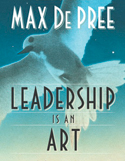 Max De Pree, Leadership Is an Art
Max De Pree, Leadership Is an Art
I first read this book in 1993 as I was beginning my current role in leadership. Having read through these pages many times since, I continue to regard this book as one of those pillars of discernment and wisdom about the complex art of leadership. I recently wrote to Max, my friend and mentor, to tell him that everything I know about leadership I learned from this little book (and several others he wrote). That is not totally true, of course, but almost. This is a gem. It is quiet and understated and penetrating. There is a philosophy here, worked out over a long period of time. It’s guiding principle is that people matter. It’s other guiding principle is that ideas matter. Shaping one’s leadership around those two principles is the challenge and the art of every leader. I am usually skeptical about books on leadership that are written by people who have never been tested under the heat of making real decisions that impact people’s lives. Max is not in that category, of course, having served as CEO of the Fortune 500 Company Herman Miller. But experience is not totally it either. It is the insight, the reflection, and most of all the deep convictions that Max brings to this guiding text of my life as a leader.
 Ronald C. White, A. Lincoln: A Biography
Ronald C. White, A. Lincoln: A Biography
In the year of Abraham Lincoln’s bicentennial celebration, my good friend, Ron White, has written what may be the best biography of Lincoln for our generation. This is a fabulous book. I highly recommend it. Ron is a storyteller, and he has now buried himself in the stories of Lincoln for some 15 years of research and study and reflection.
Ron’s style is much like Lincoln’s: understated, quiet, concrete, incisive, even brief. He lets the stories speak for themselves. He sees Lincoln as one who leads with ideas, a leader who leads with language. Lincoln has written some of the greatest speeches in American history, and Ron opens up each of them with great attentiveness to nuance and rhetorical strategy.
While much of Lincoln scholarship of late has viewed Lincoln as at best agnostic, brooding and melancholy, Ron sees Lincoln as a man of deep and honest faith, a leader who reaches down into the deepest resources of the Christian faith for conviction, principles, and spiritual guidance. This is a book that can help us understand our own American story, a book that perhaps can show us direction for the future.
Rumer Godden, In This House of Brede
I read this delightful novel over the summer, and I highly recommend it. I can’t remember where I discovered this writer, but Rumer Godden was totally new to me. She was born in England, though she lived most of her life in India, a life that spanned most of the 20th century. This novel is quite exquisite. If you are looking for the intricacies and mysteries of plot, forget it. We enter here a Benedictine convent called Brede, and we find ourselves fully engaged with these amazing nuns. We get to know each of the nuns, their struggles, aspirations, gifts. They are indeed eccentric, each a highly individual character, each bringing a unique ingredient into community. We enter into the quiet intrigue of monastic politics, always there, always just beneath the surface. We understand by the end something of Benedictine teaching, leadership, community life, the importance of worship. We understand in the end something more about what it means to live in genuine community, to live with a common story of deep faith at the center of our life together. What a privilege and delight it is to spend this time in “the house of Brede.”
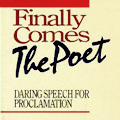 Walter Brueggemann, Finally Comes the Poet: Daring Speech for Proclamation
Walter Brueggemann, Finally Comes the Poet: Daring Speech for Proclamation
Actually I read this book a number of years ago, but I find myself dipping into it over and over all the time. This is truly one of the important books in my life. I believe that not much is done without imagination. Life requires imagination. Leadership requires imagination. Changing the world requires imagination. And Brueggemann guides us into the unique and powerful biblical imagination. The great poets of the Old Testament, he says, “discerned the new actions of God that others did not discern,” but they also “wrought the new actions of God by the power of their imagination, their tongues, their words. New poetic imagination evoked new realities in the community.” This voice becomes “real and winsome,” Brueggemann says. It becomes “authorized and authorizing — in the face of ideologies that want to deny, dismiss, and preclude.” That’s the kind of imagination we need for our day. That’s the voice we need to speak.
 Jürgen Moltmann, Theology of Hope
Jürgen Moltmann, Theology of Hope
This book was originally published in 1967. I had read portions of it along the way, but in expectation of Professor Moltmann’s visit to our campus, I read the book again. I was profoundly moved. I experienced one of those rare kind of reading experiences that shapes one’s life. The heart of this book is that we live as Christians in the light of God’s promise to make all things right in the end. And so we live, as Moltmann says, in “the glow that suffuses everything here in the dawn of an expected new day.” That’s our promise. Watch for the signs of the new things God is doing. But even more, work back from that promise to make the world a better place now. Our faith is “forward looking and forward moving, and therefore also revolutionizing and transforming the present.” That’s the message. That’s our hope. I want to live my life in the light of that hope. I want to do everything I can to change the world with that hope. This great German theologian can offer up some challenging prose at times — but it is well worth the effort. I highly recommend this great book.
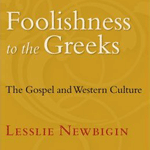 Lesslie Newbigin, Foolishness to the Greeks: The Gospel and Western Culture
Lesslie Newbigin, Foolishness to the Greeks: The Gospel and Western Culture
If I could require one book to introduce us all to the strategy and posture of cultural engagement, this is it. This incredible book was written in 1986. Dated, some might say. I don’t think so. Lesslie Newbigin — philosopher, theologian, and missionary to India for most of his life — is quite simply incredible. What does it mean to live and think as vibrant Christians in our modern, postmodern, secular culture? What does it mean to embrace the Christian story in an age when all stories of what is true are called into question? This is a must-read for all of us who consider, as I do, the task of cultural engagement as critical. I consider this book perhaps the most penetrating guide to engaging the culture with the gospel of Jesus Christ written to date.
 The Inferno of Dante, translated by Robert Pinsky (Counterpoint, 2005)
The Inferno of Dante, translated by Robert Pinsky (Counterpoint, 2005)
I was alerted by an article in The New York Times last spring about the relevance of Dante’s Inferno to the then-unfolding drama of Bernie Madoff. Having not read this great medieval work since college, I immediately got a copy of Robert Pinsky’s recent and beautiful verse translation. I highly recommend the journey, though you must understand, you are entering a world that is not pretty. This is a journey through hell, as we know, with a 14th-Century view. The agony is unrelenting. Mercy is nowhere to be seen. But the book is also highly contemporary for Dante. He meets a lot of people he knows from the streets of his own Florence. He meets every form of human foible, and he reflects on the violation of God’s notion of human flourishing. We are called by this great work not only to consider the horrifying prospects of hell, but to live differently.
 N. T. Wright, Surprised by Hope: Rethinking Heaven, the Resurrection, and the Mission of the Church
N. T. Wright, Surprised by Hope: Rethinking Heaven, the Resurrection, and the Mission of the Church
I have been deeply impacted by this fresh, stimulating, provocative view of the resurrection. I know some of this is a bit controversial, a challenge to our conventional views of heaven. But Wright reminds us that the resurrection of Jesus Christ, that mysterious claim at the center of our faith, is profoundly fundamental to the way we carry out the mission of God’s people in the present. There is hope out ahead! — and so we can and we must live as hopeful people, changing the world in anticipation of what’s yet to come.
 Wendell Berry, Hannah Coulter: A Novel (Counterpoint, 2005)
Wendell Berry, Hannah Coulter: A Novel (Counterpoint, 2005)
This is one piece of Berry’s marvelous saga of rural life in Southern Kentucky — families caught up in social and cultural forces of profound change beyond their control. This is the tragic passing, in Berry’s view, of the deep agrarian roots of American culture. Hannah watches her children leave the farm to pursue their own vocations and comes to the painful realization that she will be the last to live and flourish, even through the hardships, on this precious land. The book is beautiful, reminding us of deep, important values of an agrarian society — hard work, perseverance, living without debt, keeping on in the face of hardship and loss, celebration of bounty, stamina during lean times. This book mourns the loss of the passing of a way of life. We have much to learn from Hannah Coulter.
 George Eliot, Daniel Deronda
George Eliot, Daniel Deronda
While not Eliot’s masterpiece, this fascinating Victorian novel written in 1876, centers around a young woman named Gwendolen — a feisty, brilliant, beautiful woman who is constantly confronting a society that limits the choices for a woman—and our hero, Daniel Deronda, a sensitive and inquisitive young man. Through an amazingly complex, intriguing plot, we look in as one of England’s great novelists explores the emergence of a thriving, increasingly vocal Jewish community at the beginnings of the Zionist movement. What exquisite prose, such beautiful, nuanced, complex writing that is difficult to find in these days of text-messaging. A big book — well worth a patient reading.
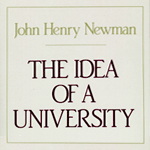 John Henry Newman, The Idea Of A University
John Henry Newman, The Idea Of A University
This is a re-reading for me, but what a journey it is. This is clearly one of the foundational statements of the purpose of the modern university ever written. Written in 1852, the result of afternoon lectures given in Dublin, Ireland, Newman was called upon by the Pope to stake out a vision statement for a Catholic university that would compete in stature with the Oxford of England. While I disagree with some of Newman’s assumptions (really, who am I to quibble with the great John Henry Newman?), nevertheless, this is where all thoughtful reflection on the nature of the university begins. Truly an extraordinary statement, masterfully delivered.
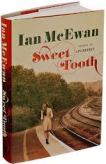
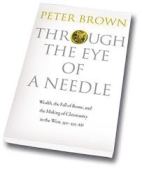


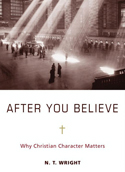


Leave a comment